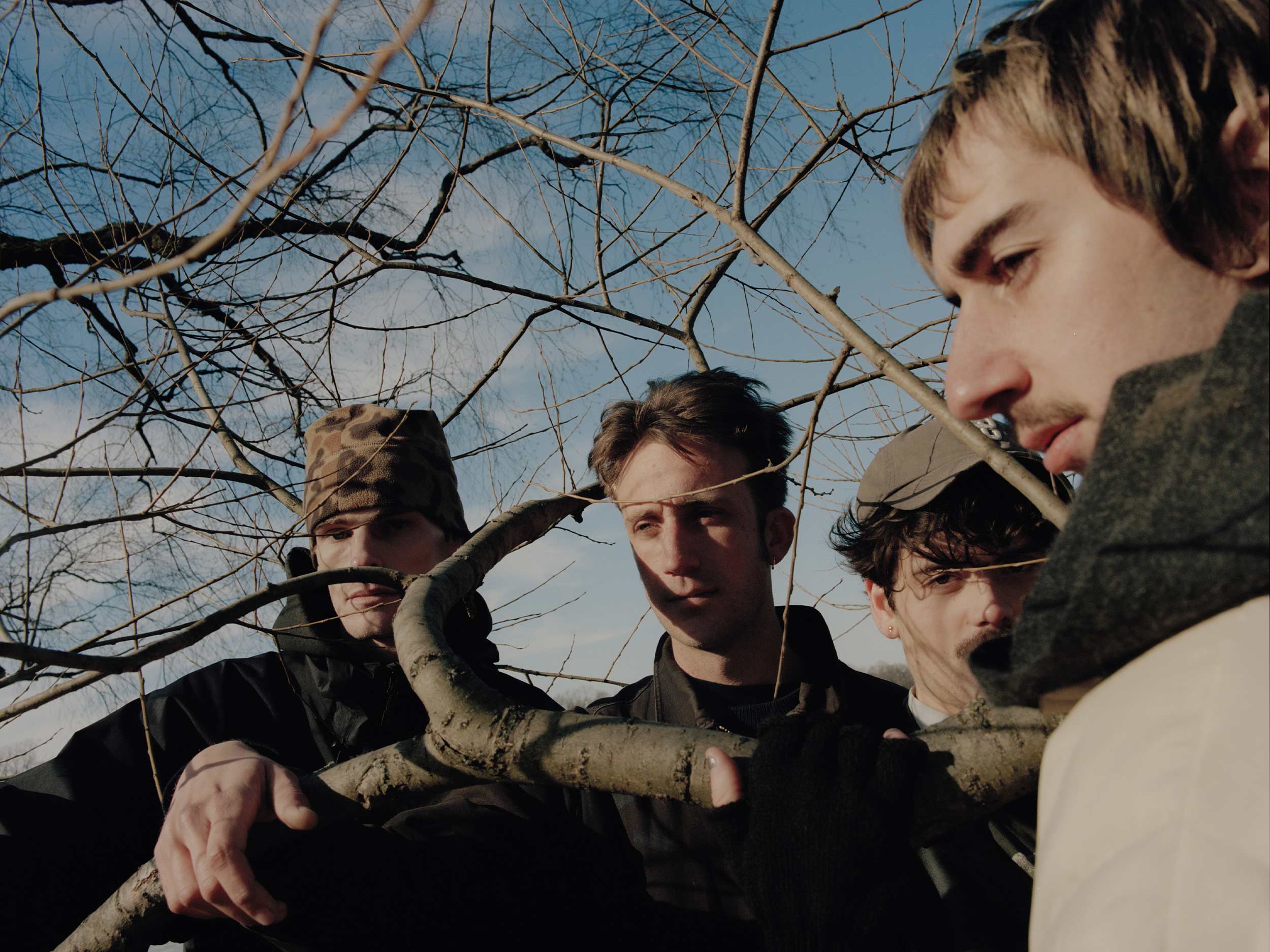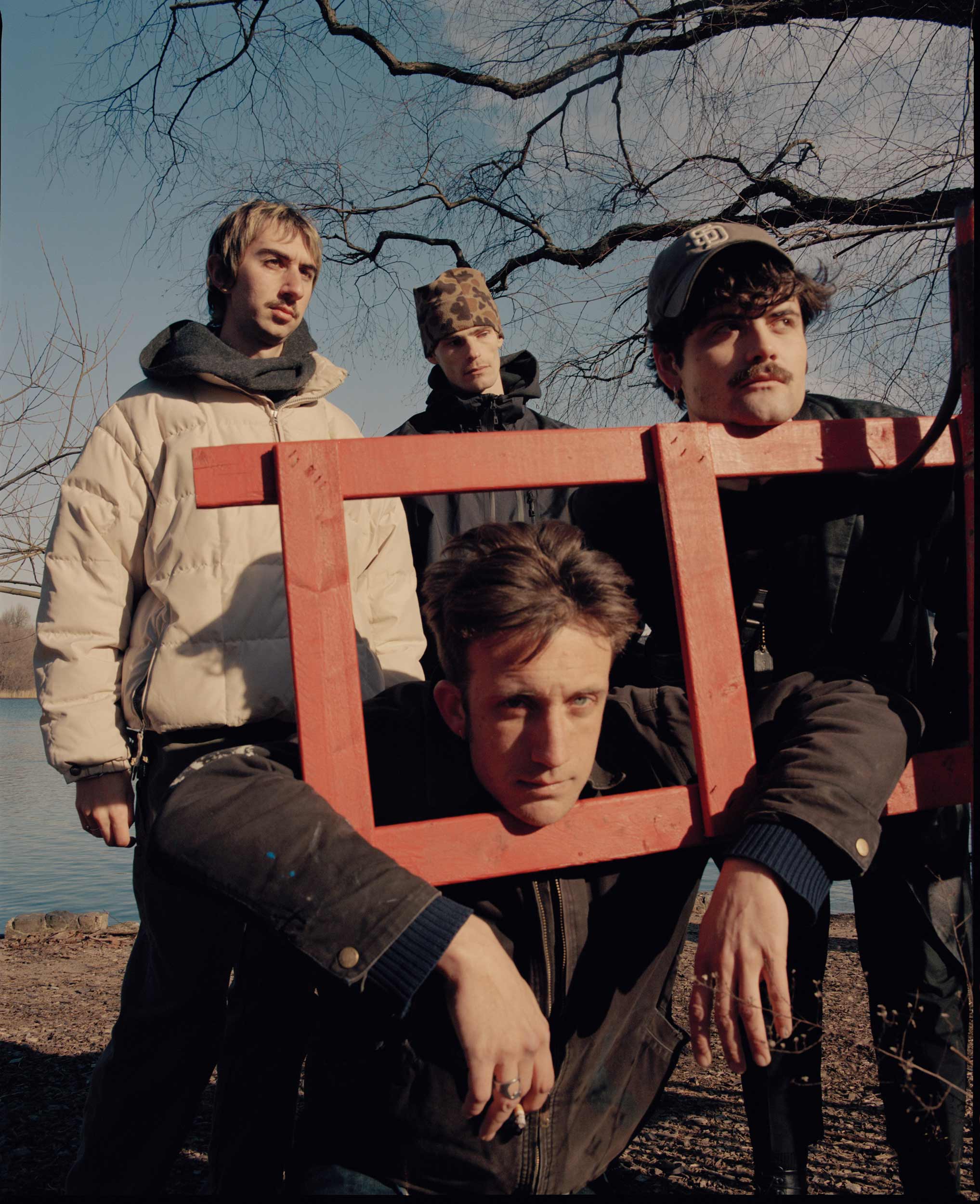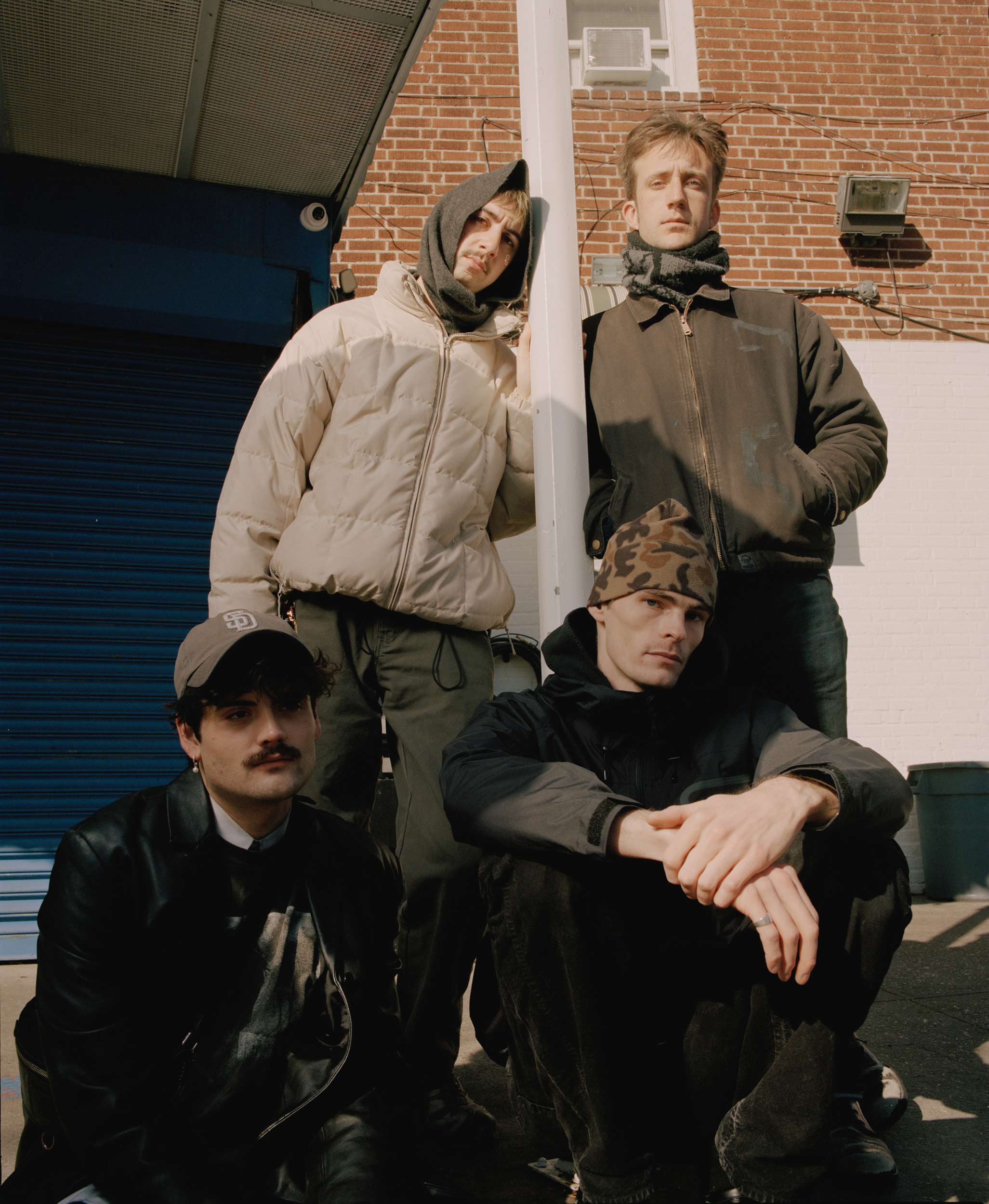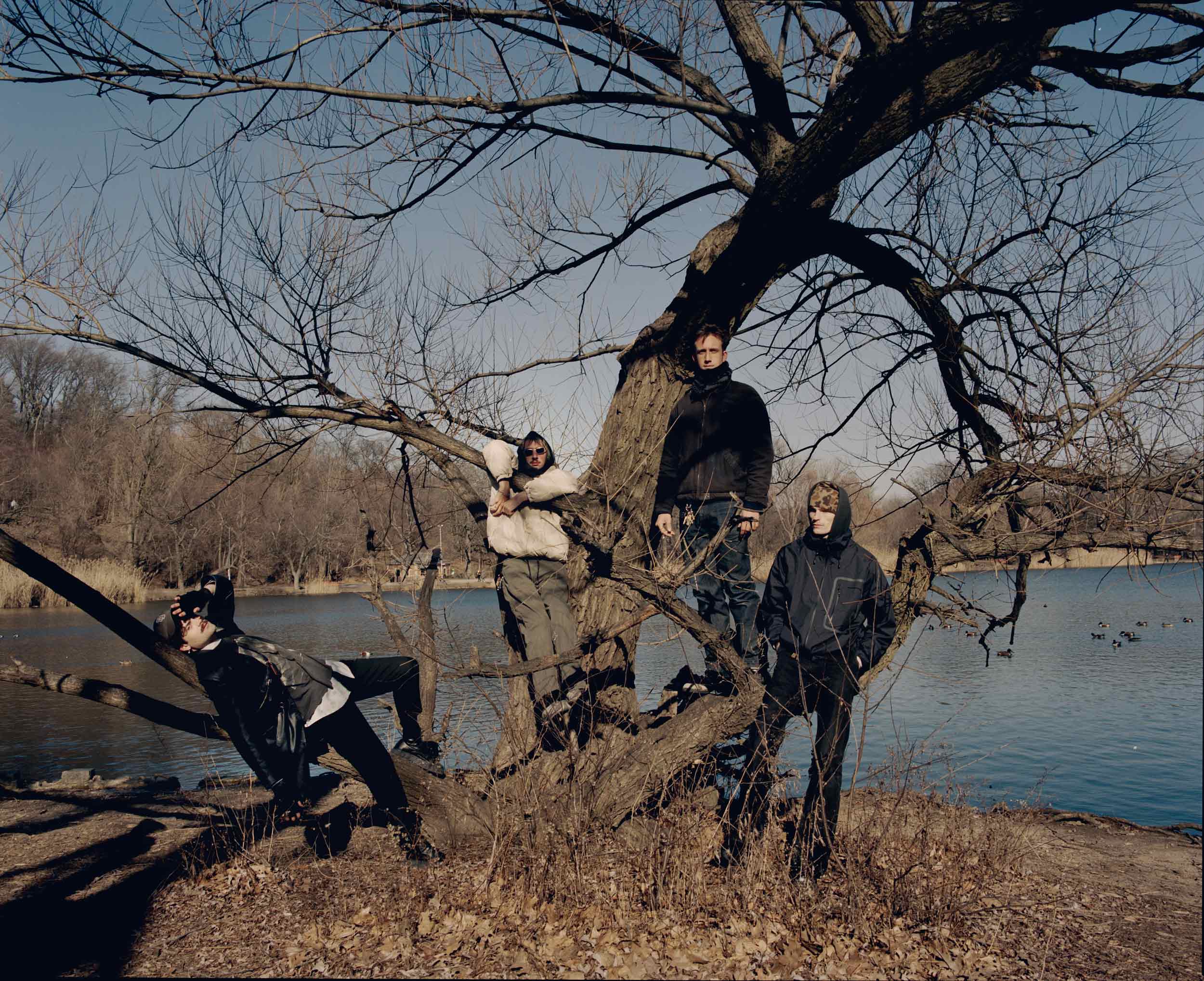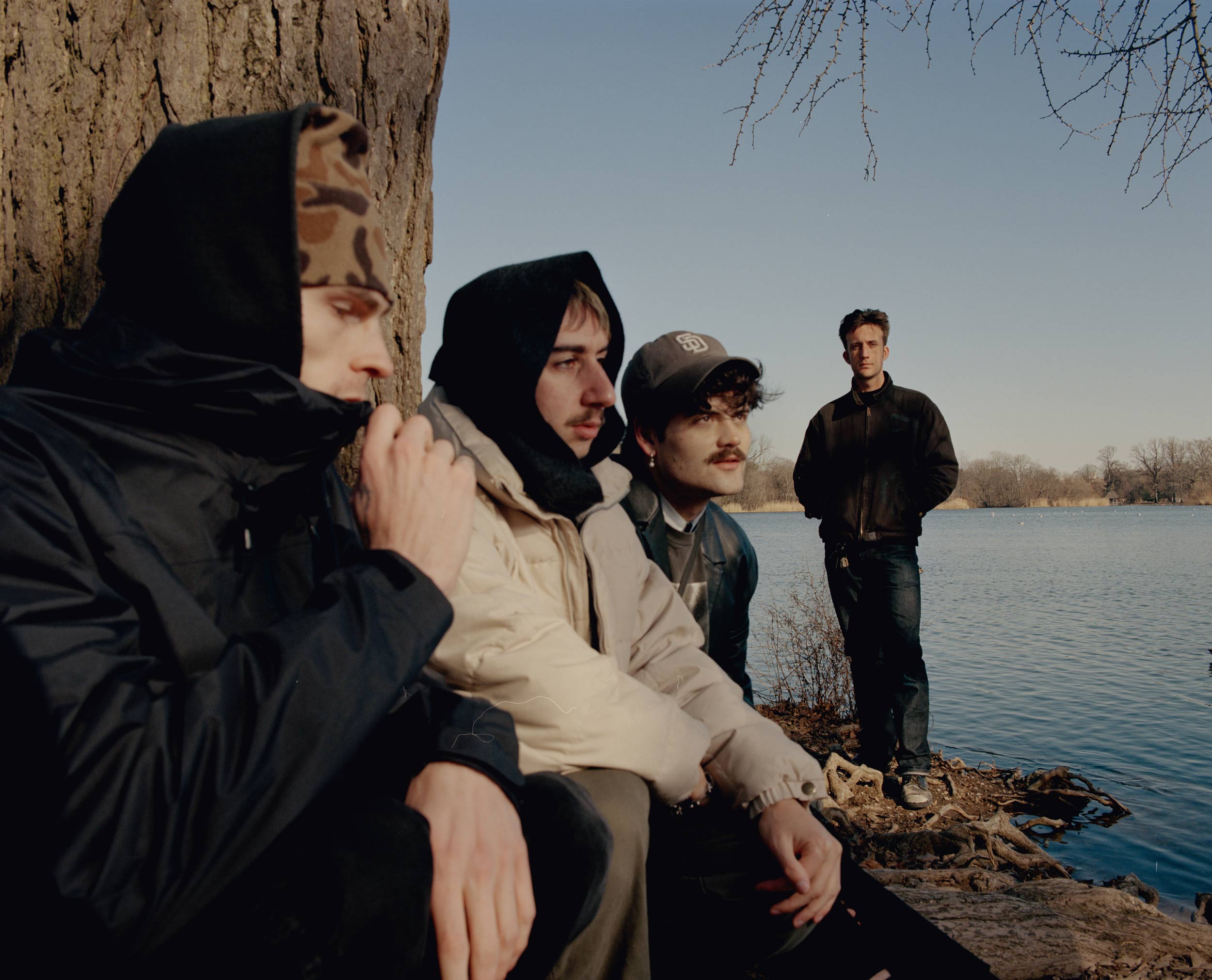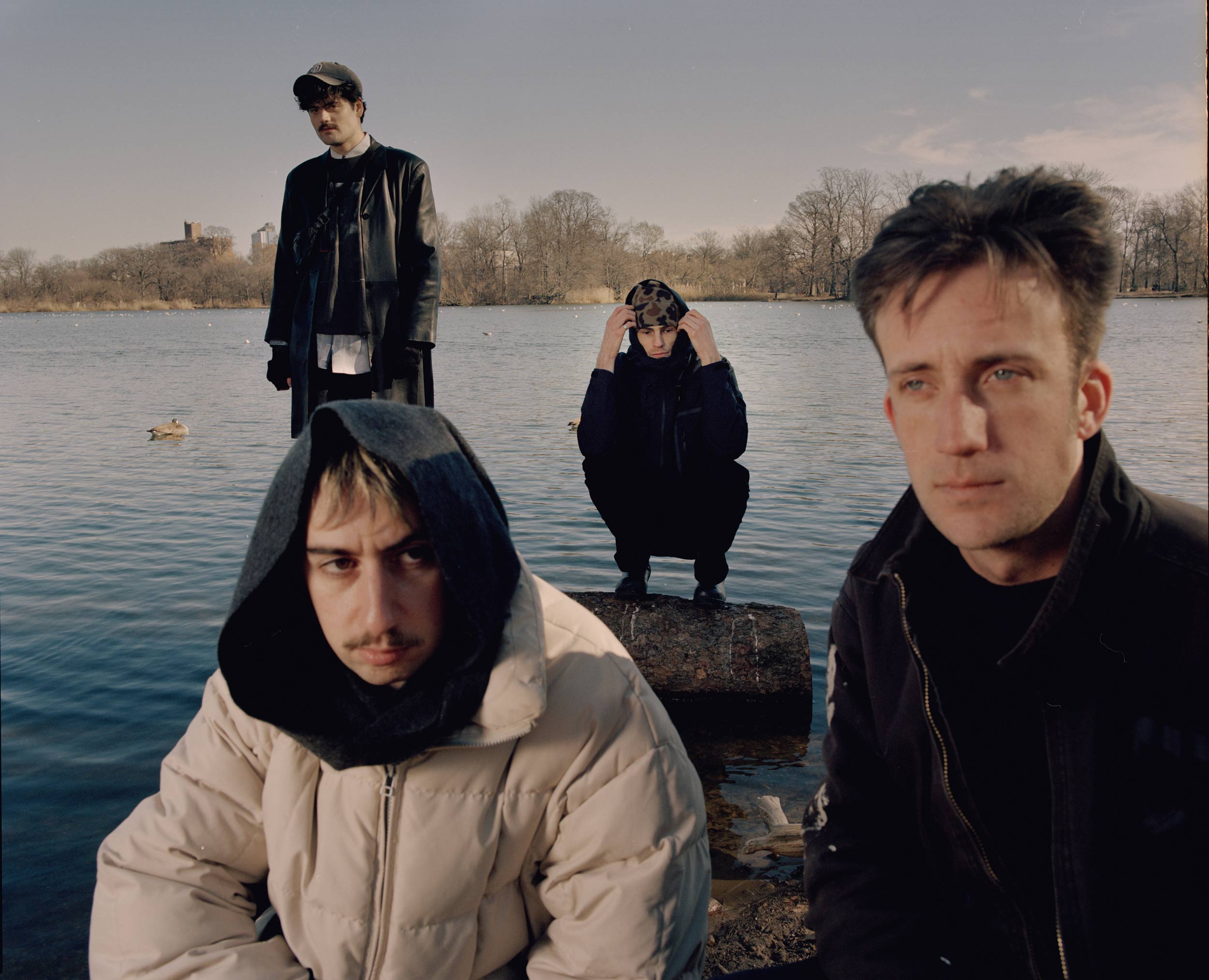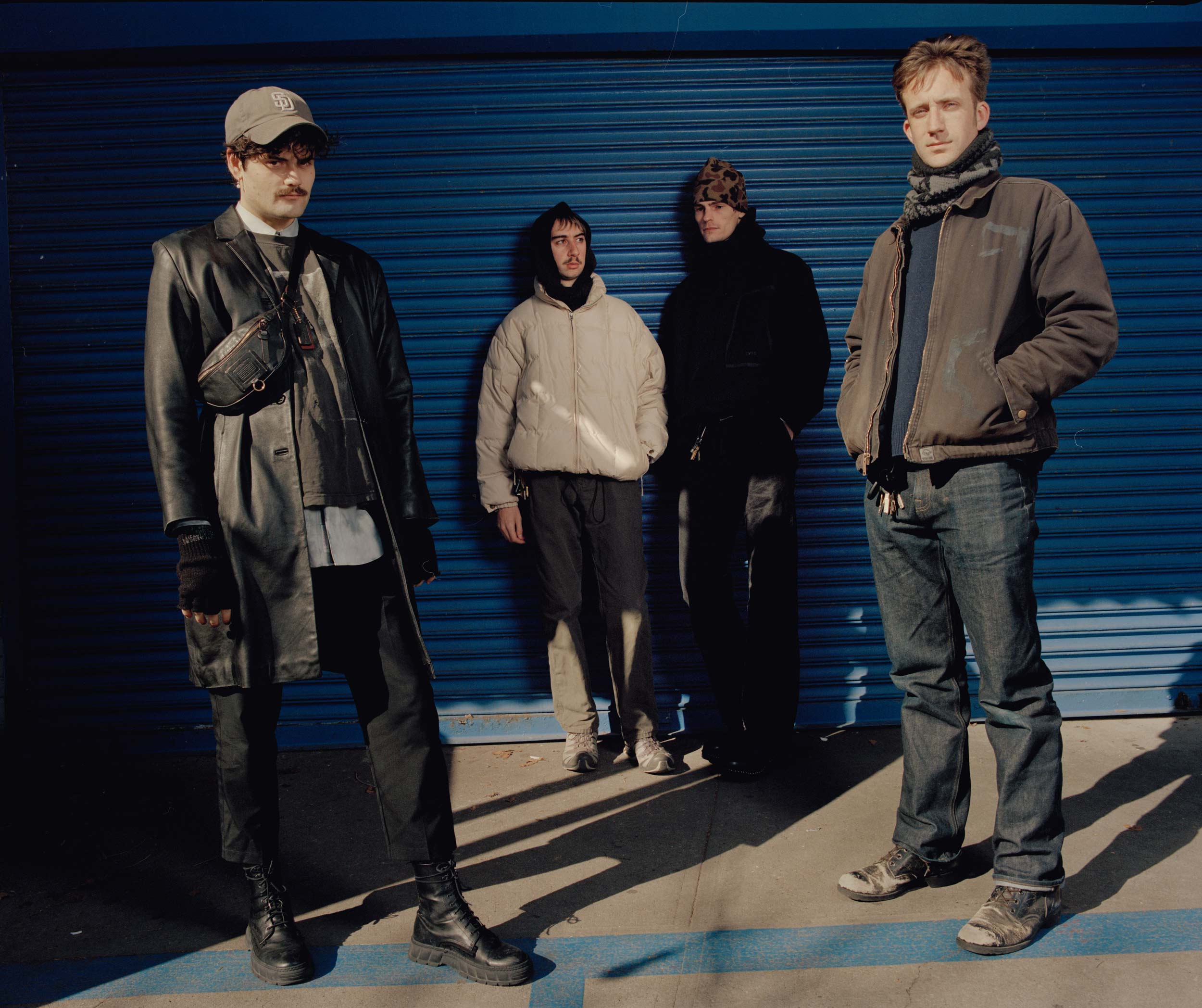Vocalist Cole Haden joins Document to expound upon the debut record’s influences, contextualize his suffering, and detail his pursuit of translating life to cabaret
A Model/Actriz show is like a liturgy, and Cole Haden is its preacher, his sacred texts built from the unexpectedly resonant experiences of everyday life. The urgency for intimacy that builds while sifting through Grindr in ungodly hours of the night, for instance, is the kind of mundane yet transcendent experience that the band’s debut record, Dogsbody, is rooted in.
Like any good crusader, Haden designs his performances with the intent to seduce, snaking through his audience so that he can properly serenade them—the length of his microphone the only distance between him and whichever adoring disciple is deemed worthy of his gaze. That theatricality is what first bewitched bandmates-to-be Ruben Radlauer and Jack Wetmore in a Boston basement in 2016, and later, bassist Aaron Shapiro. Together they are, in Haden’s words, “a traveling circus of the human condition,” their propulsive sound underpinning the vocalist’s hypnotic allure.
Dogsbody, on the whole, is a portrait of New York: lyrically, with Haden’s emotional mapping of memories surrounding the city, and in its instrumentation, which embodies the all-consuming experiences of unease and anxiety that populate it.
Haden joined Document to expound upon the record’s influences, contextualize his suffering, and detail his pursuit of translating life to cabaret.
Megan Hullander: I know you’re a Cats the Musical fanatic, and it’s again cited as an influence on this record. Does it naturally permeate into everything you do, or do you feel it’s your life’s mission to pay tribute to it whenever possible?
Cole Haden: I’m not trying to work it in—it’s been an effort in the last year to put it to rest. Not that I feel like I’m at the mercy of some musical undercurrent of my life, but I’m really trying to unpack what is going on: Why do I do this in everything that I do? But I wasn’t thinking about it when we were writing the record. It just ended up being like Cats.
Megan: You’ve classified this record as a ‘coming-of-age album,’ and, traditionally, when we think about coming of age, it trends toward teens. Do you think that period expands beyond that?
Cole: Throughout my life, in the numerous conversations I would have with my mother about pain or suffering, you would think she invented the phrase, Everything happens for a reason. But the slog of, like, picking up my damn body from all of those times, not knowing what really was meant by all of that suffering… This album is the reason for having experienced all of that. It was building to something that I’m really proud of. And in a way, it feels right to have made it now.
Megan: When you’re looking at memories—whether those be recent or distant—are you approaching them in the sense that you’re trying to get back into that space, and writing from that perspective? Or are you writing as you now, looking back?
Cole: Of the two, I would say, the latter. The memories and experiences that I’m talking about in the album have very distinct reference points. But I think my view of those memories is more empathetic now, and [I’ve] realized the divine comedy of still reckoning with the kinds of internal conflict that existed when I was entering first grade—I just have a better vocabulary now. When I go to sleep at night, I remember thinking about the same things that I do now. I wanted to write something that made me feel held, and like I understood myself to some degree.
I wasn’t trying to revisit a memory or recollect an experience. But the language of the album is about trying to capture what that dream sequence of remembering feels like—in a Proustian way, maybe.
Megan: How does that play into the concept of emotional mapping?
Cole: I have a proclivity for walking around. You know, when you’re sitting in a car, and you’re riding around, or in an Uber to a place you’ve never been before—but on the way, you see places that you didn’t realize you were going to be seeing, or you remember a time that you were there, but you didn’t realize that you would be? I think I was in college the first time I ever went to Brooklyn. So it was very, very recently that I’ve been able to build my understanding of the layout of it. And [while] going on walks, I would realize I had been places before, and not realized where they were. Seeing the ghosts of memories was like The Shining almost. I was just passing through, observing and recognizing and noticing how I felt, remembering a place I had been before, but didn’t know I would be experiencing again—that kind of astonishment.
Megan: It’s unsettling.
Cole: Yeah, like realizing that you went on a date with a guy whose apartment you’re standing right outside of, after having a casual coffee with your friend because you’re going to the record store that you didn’t realize was next door to it, because the gate was closed when you left the date. And then, all of a sudden, you’re thrust into a panic or something.
Megan: And you wrote this record in a number of different locations—was that an attempt to lean into that concept, or did it emerge from it?
Cole: I don’t know what the intention of moving around was, but it felt vital to our process. We realized, after we did it the first time, that we didn’t want to share a space with 20 other people for, like, public health reasons. It was very generous of Aaron’s parents to let us sequester [in their home] in Vermont. We would be in the basement, and we didn’t interact with them at all. They would put food on the top of the stairs, and then we’d take it once they left, but it felt like—and I’m only speaking for myself, because I don’t think it’s really that deep for [the rest of the band]—being Thomas Merton, who’s a monk, a mystic. And he wrote this book, The Seeds of Contemplation, and it had that feeling of hermeticism to it. It felt like that, because Vermont is beautiful, and we ended up writing it in these nature-centric spaces by happenstance. By the end of it, it felt like we were going on a pilgrimage of some kind. And writing in different places was the conduit through which we could have a collective meditation. I feel like we really grew as a band, to understand each other through traveling together—and not on tour—for a very abstract goal, which was to write an album.
We would go swim in a river or go on a hike, but we didn’t even know why it was important. It felt important, but it wasn’t super obvious why it did. Pitchfork just called us ‘extra,’ basically. And it’s like, Yeah, we are—which is part of why I’m able to enjoy what we do. We are like a traveling circus of the human condition.
“I wanted it to feel like my life, as a cabaret: a very earnest, kind of ridiculous, melodramatic, homespun opera.”
Megan: There’s a strong sense of narrative, lyrically. Do you approach songwriting more in terms of storytelling, or maintaining a poetic sense of ambiguity?
Cole: I want it to be poetry; I want it to look good on the page. At some point, I would like to not rely on Genius.com to display it like that. Because I did write it with the thought in mind: I want what I’m saying to sound like a song when it’s heard, but I want it to look like a poem when it’s being read.
For this album—maybe because I realized what was at stake for me emotionally, realizing that I wanted to speak about the first 25 years of my life—I wanted the lyrics to build a mythology that reflected an inner expanse: my Joker origin story. Do you feel this? Like, when you feel so deeply sad about something, when you close your eyes, you’re standing at the top of El Capitan over the sea of sadness, and you’re like, How is all of this immensity inside of my brain? How have I never experienced happiness before? You have. It’s just, when you’re sad, you don’t remember any time that you’ve been happy.
I also just have a deep love of ten-dollar words. And it felt theatrical, because it’s really part of the empathy I’m trying to give those memories of pain. So I’d imagine them being put on in a play—like the plays I would do in my living room as a kid, but with the hindsight and understanding of that person [I am now]. I wanted it to feel like my life, as a cabaret: a very earnest, kind of ridiculous, melodramatic, homespun opera.
Megan: Your lyrics are intimate, but your performances feel theatrical, and theatricality is sometimes associated with exaggeration or fabrication. Do your processes of writing and performing feel detached from each other?
Cole: When I’m writing, it’s authentic. And performing is the only time I really can escape in my mind and my body. If I’m going to have to be in my body and really be in the present moment, then what a good opportunity it is to write something that feels honest. Because then it just feels like a gift to myself. I really believe in the generosity of being honest. And maybe performing has allowed me to extend the way I tried to practice unconditional love with other people. Maybe writing this album allowed me to learn how to unconditionally love myself.
Photography Assistant Fiona Veronique.


